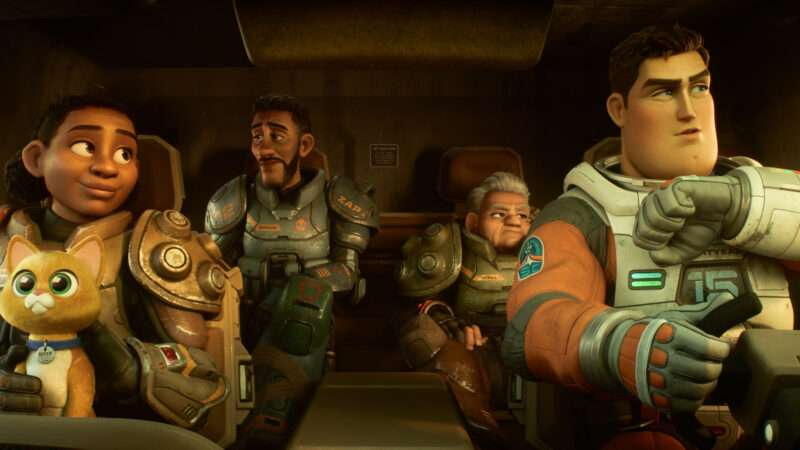
The strangest thing about Lightyear is the initial premise. This isn't just a sci-fi spinoff for the toy character whose presence disrupted the social life of a little boy's toy collection in the first Toy Story oh-so-many decades ago. Instead, it's presented as the movie that Andy, the little boy from the Toy Story films, watched in 1995 that made him want a Buzz Lightyear toy in the first place. In a title card that plays at the start of the film, the movie specifies that this is Andy's favorite film in 1995.
There are two problems with this. The first is that it doesn't play anything like a movie from the 1990s. It's jokey and hectically paced, with quippy supporting characters and some pro forma lesson-learning about what it means to grow up and accept failure. And it includes some ingrained cultural assumptions that, while handled gracefully, would almost certainly not have appeared in a popular 1990s kid-friendly movie, particularly when it comes to same-sex marriage.
So while it's better than many movies targeted at kids, it's lower-tier by Pixar's lofty standards. It's a movie that settles for kid-friendly competence rather than reaching for the stars.
But that brings me to the next problem with the premise: This is a kids movie. Yes, it's a sci-fi-tinged picture, with some robot action and an ostensibly dangerous planet, but the tone is light and snarky, without any real sense of danger or darkness. Kids might like this sort of thing, especially younger ones. But it's hard to believe that a boy like Andy would pick this, of all movies, as his favorite film, even for a brief period of time.
It's too generic, too cute, and most of all, it doesn't feel in any way like a gateway into adult ideas and feelings. And kids like Andy—a creative dreamer who'd had some hard times in his life and partially retreated into a fantasy world in which his toys come to life and have a complex friend-society—tend to gravitate toward movies that feel like introductions to something beyond their own childhood experiences.
I distinctly remember an elementary school exercise from my own childhood, which would have taken place in the early 1990s, in which my classmates and I were asked to name our favorite movies. Some of the top choices were R-rated fare like Aliens and Terminator 2. Even the less-aggressive picks were movies like The Wizard of Oz, a child's fable with a dark undercurrent.
Yet Lightyear is a kids film that only very occasionally treads into more adult thematic territory, with Buzz Lightyear going on a series of space missions that involve time-dilation, so that every time he leaves, his community ages four years, while he ages just a few minutes. This leads to one of the movie's best sequences—a montage depicting the passage of many years on the ground, while Buzz stays the same age.
Among other things, that sequence delicately portrays a marriage between two women, including a brief, loving kiss at a 40th-anniversary ceremony that has produced some controversy, including bans in multiple countries. It's warm and touching, but it's also another anachronism. Unless Andy lives in a universe with a substantially different social/political trajectory than ours, it's hard to believe it would have appeared in a kid-friendly space epic in 1995, during Bill Clinton's presidency, when less than 30 percent of Americans supported same-sex marriage. Today, of course, support for same-sex marriage is very broad, if not quite universal, but that just reinforces the awkwardness of the setup: In no way does Lightyear feel like a movie from 1995.
Rather, it feels like a modern Pixar movie, with action, heart, and humor aimed squarely at the squirmy-kid set, and an emphasis on frenetic back-and-forths and obvious sight gags. Pixar's movies have always had elements of calamitous comedy to them, but they've also tended to be smarter, slower, and more reserved than other kid-friendly animated films. Studio executives at Disney, which was overseeing Pixar's debut film, reportedly pushed for the original Toy Story to be edgier; part of its charm was its relative quietness, which allowed some real emotion to shine through.
There's no such depth of feeling in Lightyear, which is disappointing given Pixar's history of infusing seemingly kid-friendly products with moments of real adult feeling and darkness lurking at the edges. Pixar could have taken this premise to make a movie that actually said something about the 1990s, rather than dutifully reflecting the current moment, but it chose not to.
The post Pixar's <i>Lightyear</i> Is an Underwhelming Anachronism appeared first on Reason.com.







